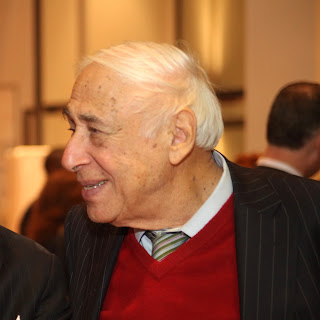Guarding Against Cynicism
One of the reasons that I stepped down from running the Center for Court Innovation earlier this year is that I found myself edging closer and closer to becoming a cynic. I don't think this is all that unusual -- over time, many people in the nonprofit sector find themselves moving from idealism to pragmatism and then to cynicism.
I first started thinking about the dangers of cynicism a few years ago when I was asked to contribute a chapter to a book about Herb Sturz. (For those who don't know him, Herb founded the Vera Institute of Justice in the 1960s and went on to an illustrious career that included stints working for the Koch administration, the New York Times, and Open Society Foundations.)
This is an excerpt of what I wrote about Herb, who is more than 30 years older than me:
A few years ago, I participated in meetings convened by Mayor Bill de Blasio's transition team to review potential job candidates for public safety positions in the administration. Herb also attended, along with a few dozen other people.
The meetings were long and it was unclear how much the group's feedback would inform the decision-making process. I found it a challenge to stay engaged.
When my mind began to wander, I looked toward Herb. I wondered how many similar meetings he had attended across his career. How many different probation commissioners (and mayors) had he seen come and go? Surely he was experiencing the same sense of ennui that I was.
But no. When I made eye contact with Herb from across the table, what I saw was not boredom or cynicism or despair. What I saw instead was someone who was fully engaged with the task at hand. It was pretty clear in that moment that he did indeed care more than everyone else at the table.
This is as close as I have come to putting my finger on the secret of Herb's success.
Over the last several months, I have interviewed a variety of non-profit leaders for New York Nonprofit Media. The executives I have talked to represent the diversity of the sector: big organizations and small organizations, advocacy groups and service delivery groups, old agencies and emerging agencies.
I can’t speak to what these folks are like behind closed doors, but I can say that they all seem to have managed to avoid becoming cynics. To a person, each of the non-profit leaders I have spoken with has communicated a commitment to using their powers to improve the world, even in the face of daunting obstacles. I have found these conversations a helpful antidote to the pervasive pessimism that seems afloat in the world at the moment.
But don't take my word for it -- check out the interviews I have done so far:
Meg Barnette, Nonprofit New York
Herb Sturz, Vera Institute of Justice
Roundtable: The Post-COVID Nonprofit
Roundtable: Responding to Race and COVID-19
Emma Jordan-Simpson, Fellowship of Reconciliation
Colvin Granum, Bedford Stuyvesant Restoration Corporation
Wayne Ho, Chinese-American Planning Council


